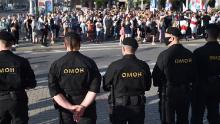Svetlana Tikhanovskaya’s campaign said she fled her apartment due to safety reasons after police detained several of its senior staffers, in what critics called an attempt to intimidate the opposition ahead of the crucial vote.
Tikhanovskaya has previously said in interviews she had to send her children abroad after receiving threats they will be placed in an orphanage.
“She won’t spend the night at home so that she is not alone,” Tikhanovskaya’s campaign said. “But she is not fleeing Minsk, she will remain in the city.”
Tikhanovskaya, a former English tutor, became an unexpected rival and face of the opposition in the past two months after taking over from her husband, Sergey Tikhanovskiy, a popular YouTube blogger and former candidate who has been jailed since May.
Tikhanovskaya joined forces with two women who ran other opposition campaigns after their candidates were also either barred from running or jailed.
Her campaign rallies saw big turnouts even in small Belarussian towns that are not known for their protest activity. The largest event in the capital of Minsk this July gathered around 63,000 people, making it the biggest demonstration in the past decade.
On the eve of the vote, Tikhanovskaya’s campaign manager Maria Kolesnikova was briefly detained and taken to a police station for questioning. A day before that, campaign manager Maria Moroz was also briefly detained.
Sunday’s main voting day was preceded by several early voting days. Late Saturday, Belarus’ Central Elections Committee reported a record turnout number, saying that 41.70% of all voters have already cast a ballot.
Users in central Minsk are having difficulties accessing major internet services and social media networks on Sunday, according to multiple local media reports and a CNN stringer on the ground.
Most apps and websites are taking longer to load, including Whatsapp, Viber, and Facebook messenger. Telegram messenger, which serves as the main communication tool for Belarusian opposition, has been unavailable at times or only accessible via proxy servers.
NetBlocks, an NGO that tracks internet shutdowns worldwide, said in a tweet it has recorded significant disruptions in Belarus: “Real-time network data show social media and other services now becoming unavailable on multiple fixed-line and cellular operator.”
Lukashenko has ruled the former Soviet republic of more than 9 million people since 1994. He has long drawn international criticism for suppressing dissent, and the country’s secret police — still known as the KGB — often detain and harass opposition activists and independent journalists.
Independent observers in Belarus such as the “Honest people” volunteer monitoring group said they have found significant discrepancies between the officially announced turnout and the number of people entering the polling stations they were able to count.
Most independent observers have been barred from monitoring this election. Several dozen independent observers have been detained on Saturday and early Sunday, according to the “Honest people” and “Right to choose” monitoring initiatives.
The Organization for Security and Co-operation in Europe (OSCE) said in July it will not be sending observers to Belarus due to no invitation from the country’s authorities and expressed “deep concern at reports that prospective candidates had been intimidated and opposition activists arrested.”
In the run-up to the election, law enforcement seemingly stepped up its crackdown efforts as riot police made multiple arrests to break up impromptu demonstrations against Lukashenko. Local media outlets have warned of a possible internet shutdown in case protests erupt across the country.
Journalist Mikalai Anishchanka in Minsk contributed to this report.
Source : Nbcnewyork














